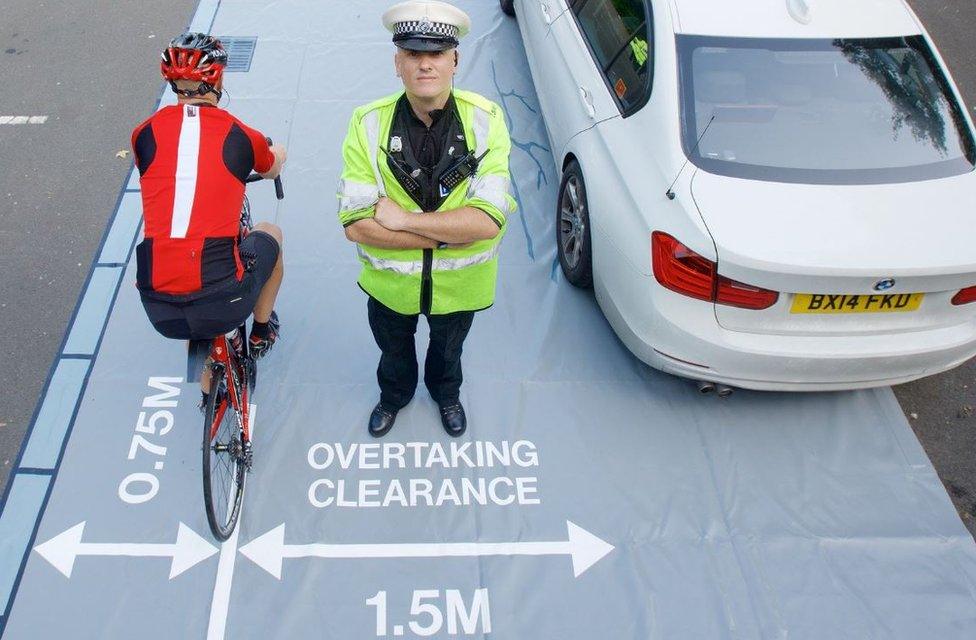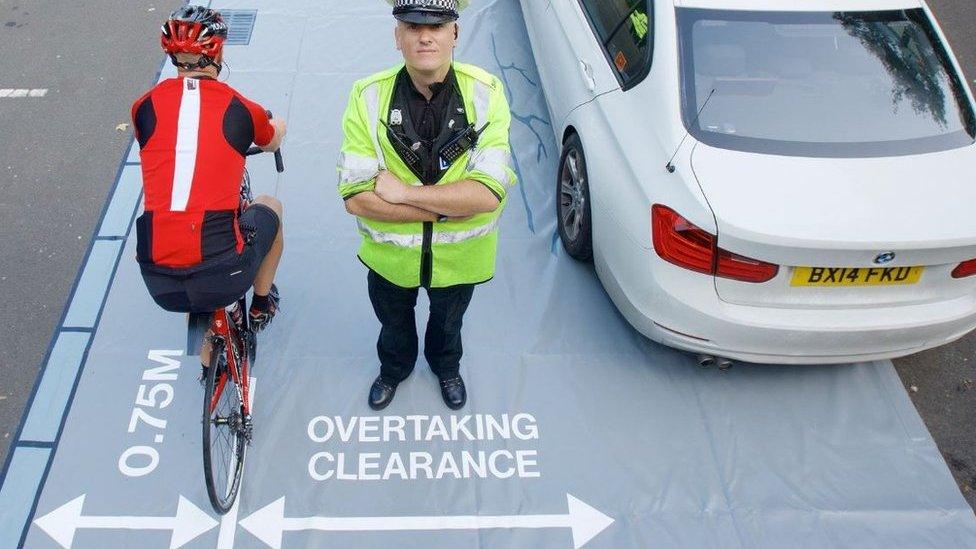Should cycling be allowed on pavements?
- Published

Police say it is a matter of respect for drivers and cyclists
Police in one London borough have said they will not prosecute cyclists who ride on the pavement, but is the decision a good move for safety and will it be adopted in other parts of the country?
Officers who work in Camden say they will not enforce the law "without good reason" and instead want to look at why riders are taking to paths instead of using the road.
Inspired by a similar operation launched by West Midlands Police, officers will talk to cyclists they see using pavements in the Primrose Hill area of the city, as well as stopping and warning drivers who overtake cyclists with a gap of less than 1.5m.
They hope to identify the most dangerous spots where riders "feel forced" onto the path.

Anyone encroaching inside the safe passing distance, widely considered to be at least 1.5m (4.9ft), will be stopped
But the decision to stop fining cyclists has polarised opinion.
Thomas Newton, who lives and works in London, said: "It's a vehicle, it belongs on the road, end of story.
"I've had several near misses with riders jumping red lights and not stopping at zebra crossings. I appreciate that there are many conscientious cyclists, but it's not those guys who are the problem."
Jonathan Morris, from Hatfield, said he feels more at risk from cyclists than cars and would not like to see the police dropping fines.
"Cyclists are everywhere, can ride very fast and cause injuries because they dart all over the place and seem to show a disregard to pedestrians," he said.
"Cars and other motorised vehicles stay in the road and are mostly predicable - even when it comes to rushing through amber traffic lights."
'Use common sense'
But Dan Jestico, who cycles with his two young children, disagrees.
"It is entirely possible to ride sensibly on the pavement," he said. "No one is suggesting that cyclists should ride like idiots anywhere, be it pavement or road.
"I cycle my two small kids to nursery on the pavement. It would be ludicrous for us to ride on the road."
Emma Richardson, from Nottingham, says it is all a matter of context.
"I don't think it would be appropriate for a cyclist to try and weave through a busy street as they risk injuring pedestrians," she said.
"But if the pavement is very empty, then no problem really. Just use common sense."
Broadcaster Janet Street-Porter says she believes pedestrians' rights are being eroded

What is the law?

The relevant law in England and Wales is the 1835 Highways Act, which created the offence of wilfully riding on a footpath by the side of the road
Enforcement of the law lies with chief police officers of each force
The offence was modified by the Labour government in 1999 to include a fixed penalty notice of £50
The Home Office issued guidance calling for careful use of police discretion, particularly in respect of children
The law is reflected in the Highway Code which prohibits cycling on the pavement - Rule 64: "You MUST not cycle on a pavement"
There are similar rules in both Scotland and Northern Ireland
Source: Stuart Kightley, partner at Cycle Injuries Solicitors

A spokeswoman for the National Police Chiefs' Council said enforcing the fines is "a local issue" and the decision would depend on each force area and "challenges they face locally".
But Sustrans, an organisation promoting sustainable transport, urged police forces to follow the lead of officers in Camden.
"We don't advocate cycling on pavements, but often fining people that do is a harsh line to take," Tim Burns, senior policy and partnerships advisor at Sustrans says.
"Many people in the UK do not feel confident or safe riding a bicycle on our roads. If we are to encourage cycling as an efficient and healthier way to get around our towns and cities whilst reducing cycling on pavements we need to better understand the concerns and needs of people and provide adequate cycle provision for them."
Living Streets, a campaign group for pedestrians, wants better enforcement of the law, not less.
Dr Rachel Lee, policy and research coordinator for Living Streets, says: "We know most cyclists prefer to use the road, but a small minority continue to ride their bicycles on the pavement for reasons of convenience or safety.
"This can make pedestrians feel vulnerable - especially those who are visually impaired, suffer hearing loss or have mobility issues.
"Although Camden's emphasis on education is welcome, cycling on pavements is illegal. We want better enforcement of the law."

Rules around the world

In other parts of the world, cycling alongside pedestrians is seen as the norm.
Countries including Germany, Switzerland and Spain have invested in large networks of cycle paths or pavements that are split between cyclists and pedestrians.
Some cities in the US, such as Minneapolis and Portland, have also rolled out the extra space for those on two wheels.
And in places like Fukuoka, Japan, bicycles are banned from the road entirely and wide pavements ensure safety for both walkers and riders.

Local councils across the country say they are spending more money on creating safer cycling routes for their residents.
When he was mayor of London, Boris Johnson invested £50m into creating cycle "superhighways" across the capital.
Nottingham City Council is also investing £6m to build cycle "superhighways" across the city and it wants riders to stick to the roads.
A spokesman said: "We are investing substantially in infrastructure which allows cyclists to be segregated from other road traffic and from pedestrians, which clearly is the best possible solution for everyone.
"This isn't possible in every location and so we look to cyclists to use roads where no alternative exists. We will often warn cyclists using pavements that it is an offence that could result in a fine."
- Published22 June 2015

- Published16 September 2016

- Published9 March 2015

- Published27 August 2014
